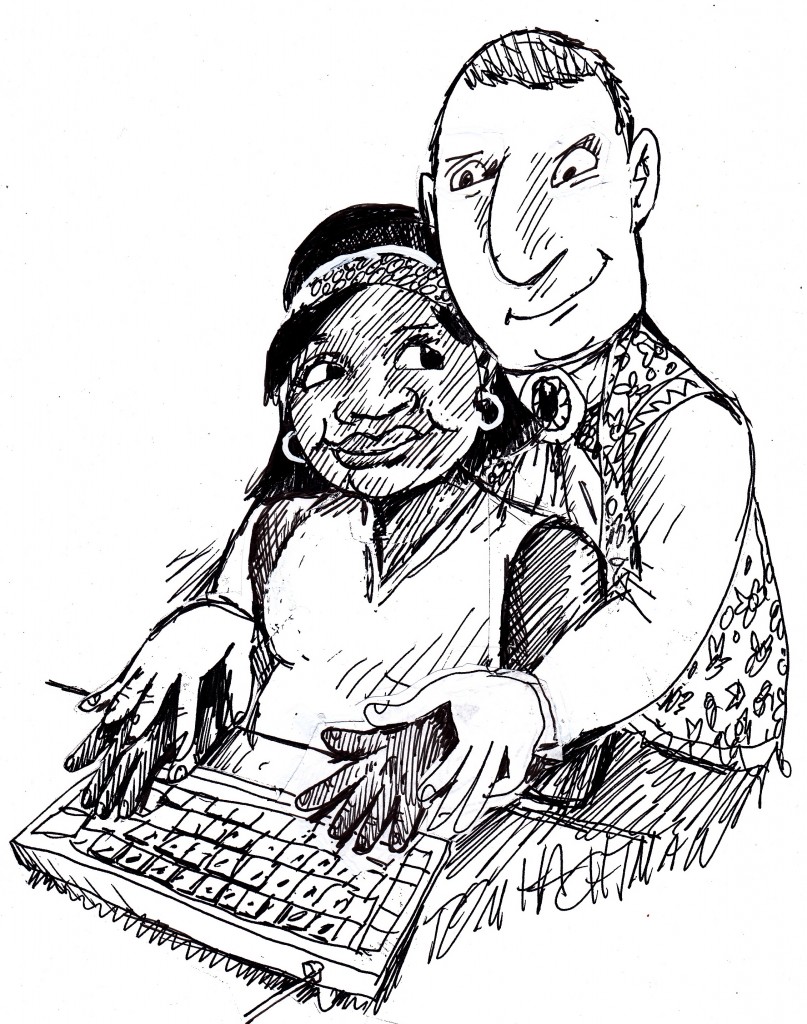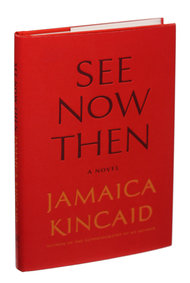JAMAICA KINCAID QUOTING GERTRUDE STEIN?
Should we call it a new sighting in our search for signs of presence in the Steinian post-renaissance? Is it a QUOTE?
“She was thinking of her now, knowing that it would certainly become a Then even as it was a Now, for the present will be now then and the past is now then and the future will be a now then, and that the past and the present and the future has no permanent present tense, has no certainty in regard to right now. (…) Every morning is the next morning of the night before: and the night before is Now and Then at the same time is the morning after the night before.”
GERTRUDE STEIN’S ABANDONED KNITTING
Could it be an unknown Stein, forgotten in some Paris attic of modernism? Is it real or is it a fake? The great Orson Wellesian question. Perhaps someone made a few cuts in the manuscript of Blood on the Dining-Room Floor (could it be Alice, always the severe editor, thinking it was already a bit crowded down there?) Let’s listen to Blood on the Dining-Room Floor:
“Every day and every day she had to see that everything came out from where it was put away and that everything again was put away. That was their way. That had always been their way. Any way was that way. Any way, she came that way to be that way. In that way she passed each day and each day passed away which was a night too.“Anybody knows that a night is not a day.“She cried when she tried but soon she did not try and so she did not cry. As a day was a day it came to be that way. But it was never only a day, and that a little left it to her still to cry, because it was a day, but it was not only a day. Every day had a day in its way.”
Or has someone dared “venture into the parlour of modernism and pick up Gertrude Stein’s abandoned knitting”? (The Guardian)
Yes, as my favorite sleuth Tom Hachtman pointed out, the remarkable Jamaica Kincaid’s latest book, See Now Then, “channels Stein” – and not for the first time. Kincaid did it again. It may be irresistible. See Now Then takes up the knitting from her earlier Mr. Potter. But the new book review in the New York Times never picks up the thread. We are given a warning, however, that could have been issued for any of Stein’s books: “You will have to back up and reread many of the sentences here just to be certain that she isn’t, in some regard, attempting satire.”
Aha, satire! Another typical Steinian suspicion. Could she be taken seriously at all? Wasn’t she making fun of her readers? And particularly her critics? Perhaps, the reviewer speculates, the satire aims at Here but Not Here, the 1998 memoir of New Yorker writer Lillian Ross with whom Kincaid’s (ex-)husband allegedly had a long secret affair? We may never know.
The Los Angeles Times finds this tangled yarn “mesmerizing”; others, like the Wall Street Journal, describe it as “little more than chunks of Ms. Kincaid’s autobiography lumped onto the page like unshaped clay.” Interesting. This reviewer, quite unconsciously, may be hot on the trail of something – in case you remember Stein’s famous statement in Everybody’s Autobiography: “My writing is clear as mud, but mud settles and clear streams run on and disappear…” The unconscious works its own funny way and maybe Kincaid’s “mud” will do just the same.
Be it what it may, whatever you can see now or then — mud-throwing, wool-gathering, channeling, satirizing, plucking music from the torn shreds of a marriage, read on, notice the word Stein as Kincaid sprinkles into the text, and be amused:
“But all that aside, for all that would have its then and has its own now, Mr. Sweet sitting on a stool in the studio above the garage, the dun-dun, wooo-wooo, whoosh-whoosh noise made by the clothes-cleaning machines, and he sat there, hovered above the black and white keys of that musical instrument made by the company called Steinway, his hands poised above those keys, his fingers extended, his fingers resembling his long-ago ancestors who lived in that long-ago era, and he composed more nocturnes, more nocturnes, and more of those: his life was not what he wanted it to be, not what he had imagined it to be even though he had not imagined it to be anything in particular other than he would be princely and entitled to doormen and poor but princely and entitled to doormen and sad because he loved ballet and Wittgenstein and opera and entitled to doormen, no matter what, there must be doormen.”
Who is this husband? A satire of the husband Stein gave her heroine in her 1940 novel Mrs. Reynolds? Perhaps yes, perhaps not, for…”sometimes people mistook him for a rodent, he scurried around so. And he was not a rodent at all, he was a man
capable of understanding Wittgenstein and Einstein and any other name that ended in stein, Gertrude included…”






Cecilia Bartoli
Thank you, Emmy, what a great guess! I love it, and now I have to research my own research topic: Cecilia! Did she take the leap and get married, after all??